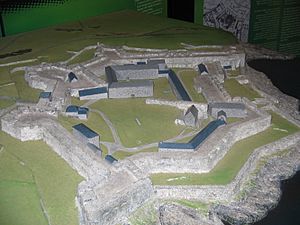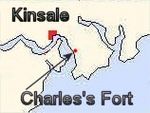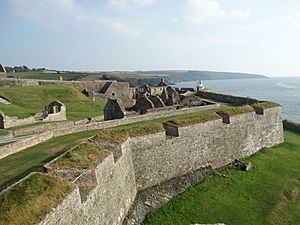Charles Fort (Ireland) facts for kids
Quick facts for kids Charles Fort |
|
|---|---|

Plan of fort showing layout
|
|

Location relative to Kinsale
|
|
| Type | Bastion fort |
| Location | Kinsale harbour, County Cork, Ireland |
| Built | 1670s |
| Governing body | Office of Public Works |
| Type | Guardianship |
| Reference no. | 535 |
| Description | Star-shaped-fort |
Charles Fort (Irish: Dún Chathail) is a famous old fort in County Cork, Ireland. It sits right by the water at the southern end of Summer Cove village, overlooking Kinsale harbour. This fort is a special type called a bastion fort. This means its outer walls stick out in points, often in a star shape. This design helped protect it from cannon attacks.
The fort was finished in 1682. People sometimes called it the "new fort." This was to tell it apart from James's Fort, which was the "old fort" built on the other side of Kinsale harbour. Today, Charles Fort is a popular place to visit. It is looked after by Heritage Ireland, which is part of the Office of Public Works.
Contents
Building a Strong Fort
Charles Fort was built on the spot where an older castle, called Ringcurran Castle, once stood. This old castle was important during a big battle called the Siege of Kinsale in 1601.
Who Designed Charles Fort?
The new fort was named after Charles II of England, who was king at the time. A clever architect named Sir William Robinson designed it. He also designed the Royal Hospital Kilmainham. Another engineer, Captain Thomas Philips, helped with other parts of the fort.
Why a Star Shape?
Building of the fort happened between 1677 and 1682. Its star-shaped design was very smart for its time. It was made to stand strong against cannon fire. The points of the star allowed defenders to fire at attackers from many angles.
The "New Fort" Name
Charles Fort became known as the "new fort." This was because James's Fort (the "old fort") was already built across the harbour. James's Fort was built earlier, between 1602 and 1607.
Battles and Changes
Charles Fort was mainly built to defend against attacks from the sea. However, the land side of the fort was not as strong. Higher ground nearby could look down into the fort. This weakness became a big problem during a battle in 1690.
The Siege of Charles Fort
In 1690, during the Williamite War in Ireland, the fort was attacked. A famous general, John Churchill, 1st Duke of Marlborough, led the attack. His army surrounded the fort for 13 days. Because of the weak land defences, the fort was eventually captured. After the battle, the fort was repaired.
Lighthouse and Later Additions
An early lighthouse was built here in the 1600s by Robert Reading. Over the next two centuries, more parts were added to the fort. These included special inner defences called "citadels."
Life as a Barracks
For 200 years, Charles Fort was used as a British Army barracks. Soldiers lived and trained there. After the Anglo-Irish Treaty in 1921, British forces left Ireland. Charles Fort was then handed over.
The Fort's Final Battle
During the Irish Civil War in 1922, anti-Treaty forces set fire to the fort as they retreated. After this, Charles Fort was no longer used as a military base.
Images for kids
 | Shirley Ann Jackson |
 | Garett Morgan |
 | J. Ernest Wilkins Jr. |
 | Elijah McCoy |








